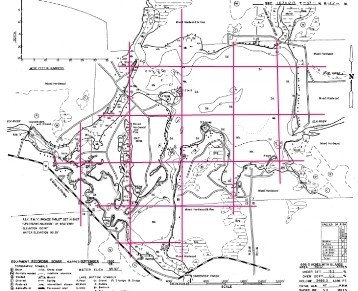Griding a Lake and Fishing in Sections

Learn to grid lake makes for great fishing. Before you start fishing, understand the lake you are fishing on. Research the lake by studying a map of the lake. Most maps show you all the details of the lake like depth, rocks, weeds, etc. These are areas where fish gravitate towards.
Once you understand the lake you are about to fish on, I would recommend that you grid the lake so that you fish the lake in sections. Grid lake allows for more focus and fishing in sections vs. maneuvering all over the lake.
Take a map of the lake and create a grid lake plan (notice how I gridded the lake with pink lines). Then fish each section within the grid. One thing to understand about the grid that you have created is that one or more sections might not produce the type of fish you want to catch. So fish the lake based on the type of fish you will be catching. Our “Fishtopia” section introduces you to the fish’s habitat to learn where you can find fish.
Understand the structures of the lake because they produce fish. Trees, logs, rocks, stumps, docks, etc. provide shelter and shade for fish. Those structures are generally located on the shoreline. Some maps from local guides detail those structures as guides know those lakes better than your average angler. We’ve caught several fish by these structures.
Lily pads also attract fish because small insects and other small water creatures live around the pads. Small fish are attracted to the small insects and larger fish are attracted to the small bait fish. Weed beds provide shelter for fish so you’re sure to find fish there.
Maps also show bay/cove areas. Smaller fish gravitate toward the bays in search of food. They also gravitate toward this area especially if the waters get slightly rough. Larger fish move into the bay areas in the morning and during dusk/night to feed on the smaller fish.
Take your time fishing within each grid because this technique provides you with more of a structure to fishing. You’ll be surprise how many fish you will catch.

